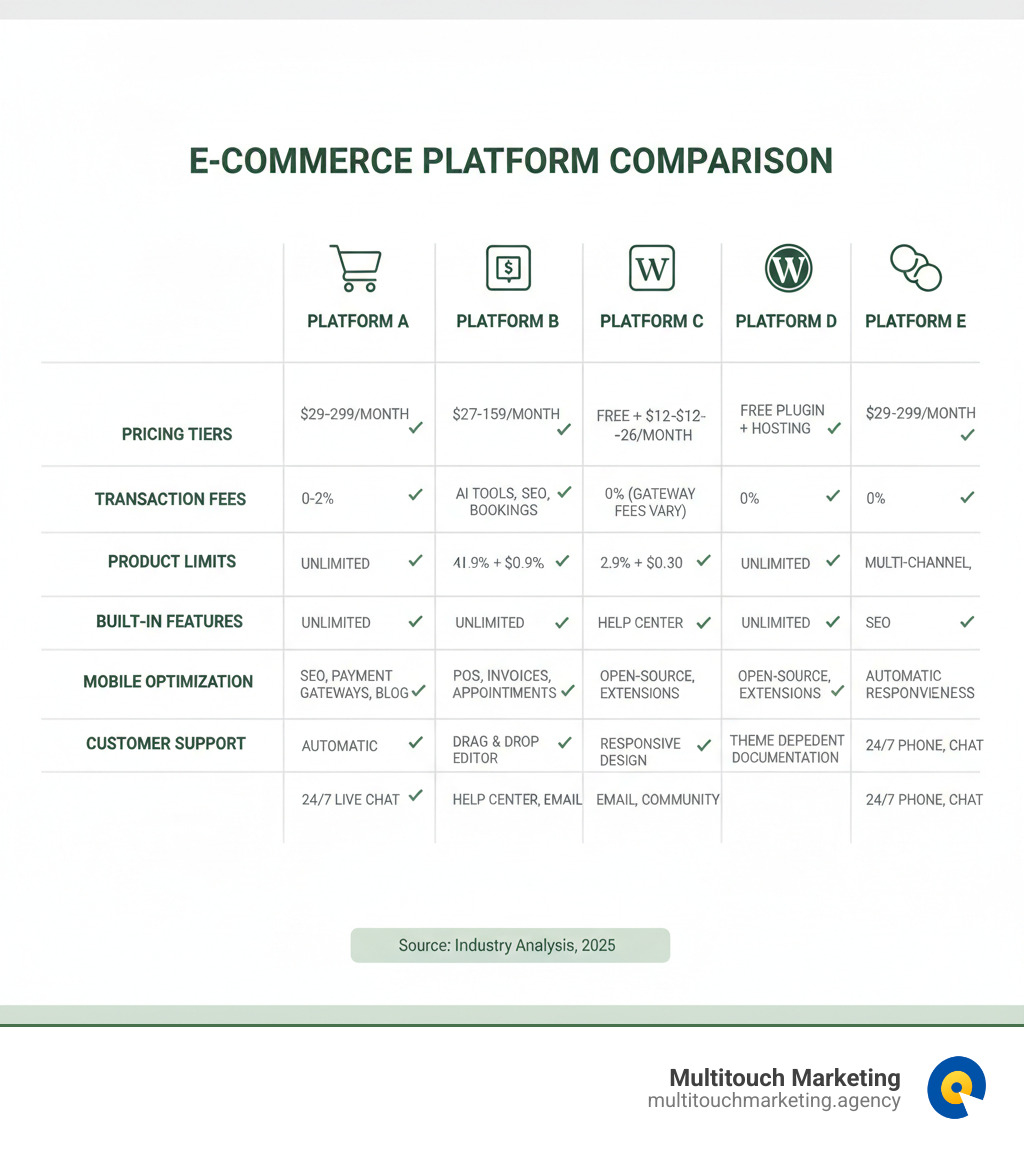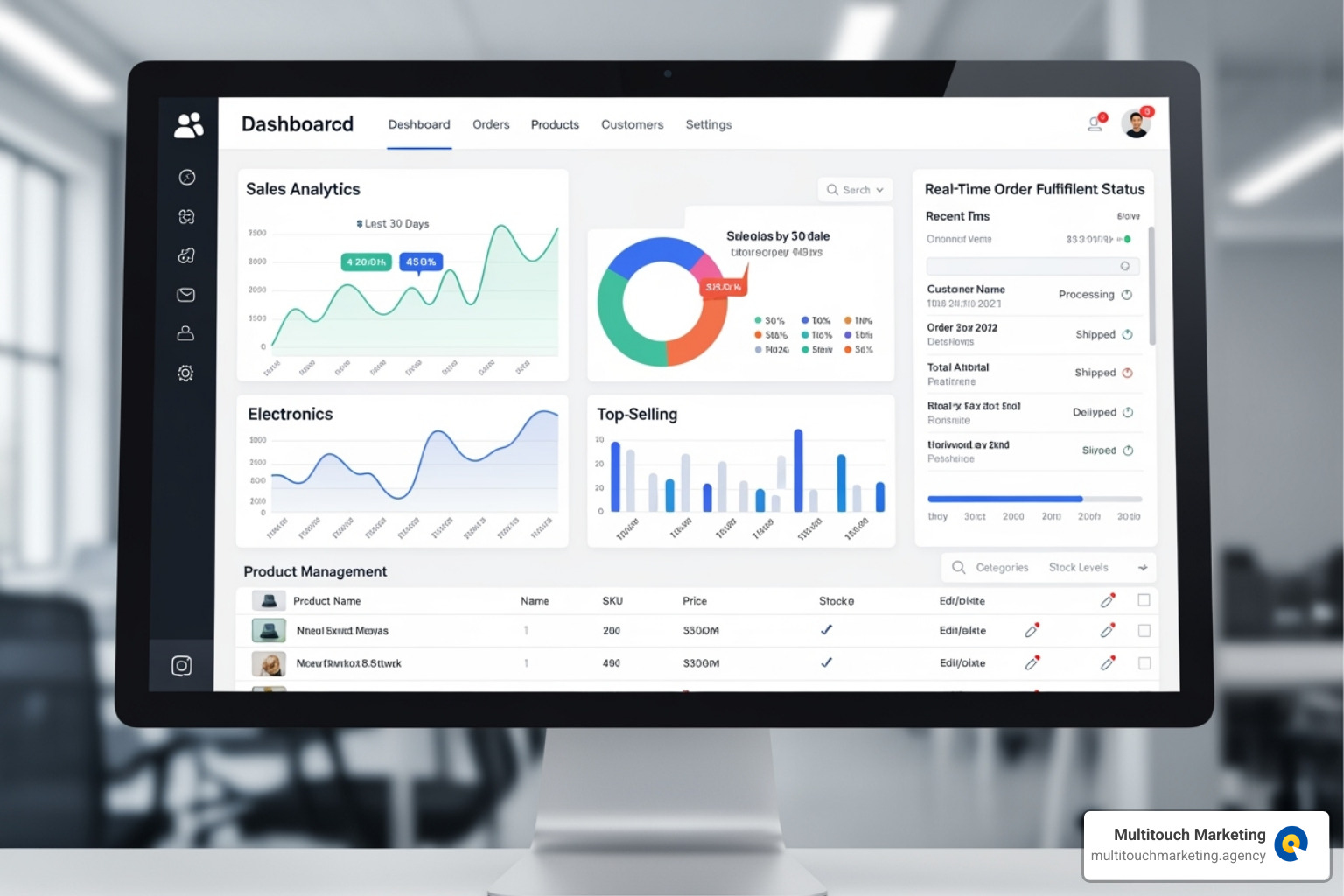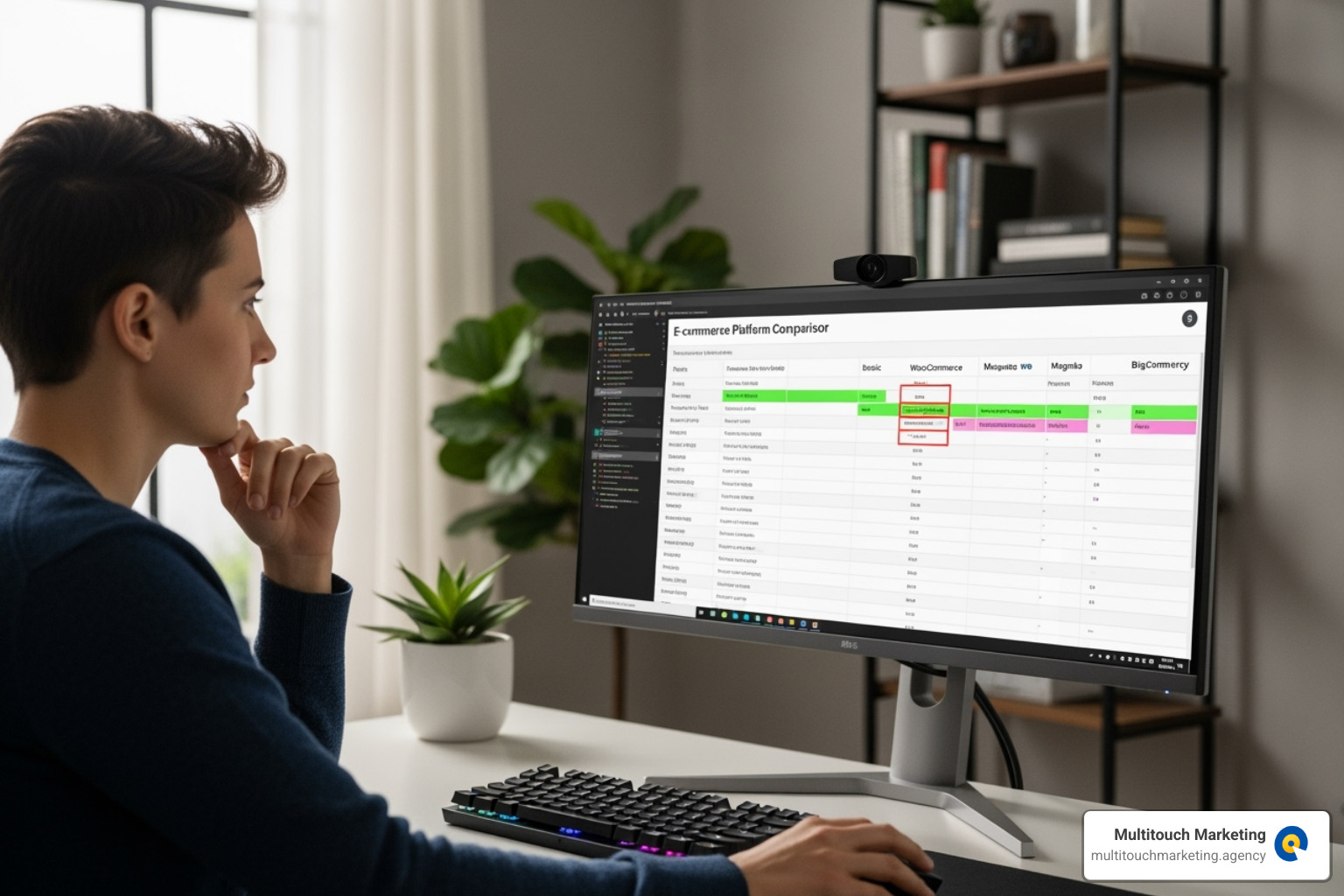Why E-commerce Success Starts with the Right Platform
Companies that offer tools to build and manage ecommerce websites have transformed how businesses sell online, making it possible for anyone to start an online store without technical expertise. Here are the leading platforms available today:
Top E-commerce Website Builders:
- Shopify – Most popular all-in-one solution ($29-$299/month)
- Wix – Best for beginners with AI features ($27-$159/month)
- Square Online – Free plan with POS integration
- WooCommerce – WordPress plugin for maximum customization
- BigCommerce – Enterprise-focused with no transaction fees ($29-$299/month)
- Squarespace – Design-focused with built-in tools ($16-$99/month)
The e-commerce market’s explosive growth means over a fifth of all retail sales now happen online, creating a multi-trillion dollar market small businesses can’t ignore. The right platform helps you reach customers 24/7 and automate business functions, whether you’re selling handmade crafts or expanding a physical store.
These platforms handle the technical side of online selling—from drag-and-drop builders to payment processing, inventory tracking, and security—so you can focus on growth.
I’m Milton Brown, and with over 15 years of experience in the digital landscape, I’ve helped businesses in e-commerce, healthcare, and education select the right companies that offer tools to build and manage ecommerce websites. My work with budgets from $20,000 to $5 million has given me deep insight into what makes these tools effective for different business needs.
Core Functionalities and Benefits of E-commerce Software
Moving your business online opens up real opportunities that can transform how you operate. When you partner with companies that offer tools to build and manage ecommerce websites, you give your business powerful new capabilities.
The most immediate benefit is that your store never sleeps. Customers can shop 24/7 from any time zone, meaning you can make money even when you’re not actively working.
Global reach becomes possible overnight. A local bakery can ship nationwide, or a boutique can attract international customers. Geography is no longer a limitation.
Cost automation is another major win. Tasks like updating inventory, processing payments, and sending order confirmations happen automatically, freeing you to focus on growth.
Modern e-commerce platforms handle the heavy lifting through several core functionalities. Storefront design tools let you create a professional-looking website without hiring a designer. Most platforms offer drag-and-drop builders and templates that make your products shine. Since most shoppers browse on their phones, having Responsive Web Design Services ensures your store looks perfect on every device.
Shopping cart functionality and payment processing work together seamlessly. Customers can add items, review their selections, and check out securely using their preferred payment method.
Product catalogs and inventory management keep everything organized. You can upload product photos, write descriptions, set prices, and the system automatically tracks stock levels.
Performance reports give you insights into which products sell best, where your customers come from, and when they’re most likely to buy, helping you make smarter decisions.
Built-in marketing tools help you attract and keep customers, with features for SEO, email marketing, and promotions.
The beauty of working with established companies that offer tools to build and manage ecommerce websites is that they’ve already solved the technical challenges, giving you enterprise-level functionality without the complexity or cost.
Top Companies That Offer Tools to Build and Manage Ecommerce Websites
This section explores the different types of platforms offered by companies that offer tools to build and manage ecommerce websites, helping you find the perfect fit for your business needs.
All-in-One Hosted Platforms (SaaS)
When you’re starting your online business journey, all-in-one hosted platforms are like having a complete team in your corner. These Software-as-a-Service solutions handle everything from hosting your store to keeping it secure, so you can focus on what you do best – running your business.
Shopify is the industry leader, known for being beginner-friendly yet scalable. Its intuitive drag-and-drop builder, over 100 payment options, and extensive theme marketplace, including thousands of themes available on ThemeForest, make it a top choice. With built-in hosting and 24/7 support, plans range from $29 to $299 monthly when billed annually.
Wix excels in design flexibility and ease of use, featuring a conversational AI builder to guide store setup. It’s ideal for integrating an online store into a larger website. Its app marketplace extends functionality, with plans from $27 to $159 per month.
BigCommerce offers enterprise-level features with no transaction fees, a major advantage for high-volume businesses. However, plans have sales volume caps; for example, the $39/month Standard tier is capped at $50,000 yearly, while the $105/month Plus tier allows up to $180,000 in annual online sales.
Squarespace is known for its stunning templates and intuitive design tools, making it ideal for brand building. Its focus on aesthetics helps create a beautiful user experience, with plans from $16 to $99 monthly.
These platforms all include built-in hosting, security features, and extensive app marketplaces for added functionality. They also offer POS integration options for businesses selling both online and in person.
Open-Source & Plugin-Based Solutions
If you love having complete control over your digital destiny, open-source solutions offer high customizability and developer control that hosted platforms simply can’t match.
WooCommerce is a powerful plugin that transforms your WordPress site into a selling machine. For those familiar with WordPress, it’s a natural extension that offers unlimited customization through its vast extensions marketplace.
While the plugin is free, you’ll need self-hosting, a domain, and possibly premium themes or extensions. Managed hosting options through WordPress.com (Business plan at $40/month, Commerce at $70/month) can simplify the technical side.
The trade-off is that WooCommerce requires more technical knowledge for maintenance, updates, and security. This is where services like Website Maintenance Services Includes become invaluable for keeping everything running smoothly. The big advantage? You own everything—your data, your code, your destiny.
Platforms with Strong Free Tiers & In-Person Integration
Not every business needs a massive online store from day one. Some companies that offer tools to build and manage ecommerce websites understand this, offering free plans and excellent in-person integration.
Ecwid by Lightspeed offers a useful free plan for selling your first five physical products. What makes Ecwid by Lightspeed special is its flexibility—you can add e-commerce to an existing site or sell directly on social media platforms, with effortless inventory synchronization.
Square Online leverages Square’s powerful POS system integration. Its robust free plan includes features like order tracking and automated sales tax calculations, offering seamless inventory management for businesses selling both online and in person. The free plan includes Square branding and standard transaction fees (2.8% + $0.30 per online transaction). Upgrading to paid plans ($29-$79/month) removes branding and adds advanced features.
These platforms excel at POS integration and social media selling, making them perfect for businesses that want to expand their reach with low initial cost.
Key Considerations When Choosing Your E-commerce Platform
Selecting the right e-commerce platform is like choosing a business partner who understands your goals, fits your budget, and can grow with you. The right choice can transform your online success, while the wrong one can create months of headaches.
First, honestly assess their budget and business goals. What can you afford monthly? Are you testing the waters with a few handmade items, or are you planning to scale to thousands of products? Your answers will narrow your options.
Your technical skill level matters. If you’re not comfortable with code, platforms with drag-and-drop interfaces are your best friends. If you are, you might appreciate the flexibility of more hands-on platforms.
Consider how much customization you truly need. Some businesses thrive with professional-looking templates, while others need a completely unique design to stand out.
Don’t overlook customer support. When your store has an issue at 2 AM, you’ll want to know help is available, whether through 24/7 chat, knowledge bases, or community forums.
Think about multichannel selling from the start. If you plan to sell on social media, marketplaces, or in a physical store, your platform should make these expansions seamless.
Finally, marketing features are essential. Built-in SEO tools, email marketing integrations, and detailed analytics are necessary for understanding customers and growing your business.
Evaluating Pricing Models and Scalability for companies that offer tools to build and manage ecommerce websites
When evaluating companies that offer tools to build and manage ecommerce websites, pricing is more than just the advertised monthly fee.
Monthly fees are the most straightforward cost, ranging from free tiers (like Ecwid or Square Online) to several hundred dollars for enterprise solutions. Shopify’s plans, for instance, range from $29 to $299 per month when billed annually.
But transaction fees can quietly eat into your profits. Many platforms charge a percentage of each sale, especially if you don’t use their preferred payment gateway. Shopify charges 2.9% + $0.30 per transaction with its built-in system but adds 2% if you use a third-party processor.
Payment gateway costs are separate from platform fees. Your processor (Stripe, PayPal, etc.) will charge their own fees regardless of your platform.
Watch out for hidden costs like premium themes ($100-300), apps ($10-50/month each), and custom domains ($10-15/year). Some platforms also charge higher processing fees on cheaper plans.
Sales volume caps can force expensive upgrades. BigCommerce’s $39/month Standard tier caps you at $50,000 yearly in online sales, while their $105/month Plus tier allows up to $180,000 annually. Exceeding these limits means an automatic upgrade.
Scalability planning prevents costly migrations. Can your platform handle holiday traffic spikes and support thousands of products? This foresight is crucial, and where partnering with experienced Website Management Companies can provide valuable guidance.
Essential Features for Small Businesses from companies that offer tools to build and manage ecommerce websites
Small businesses need platforms that work hard for them. To avoid overly complex systems, focus on these essential features first.
A user-friendly builder is non-negotiable for most. Drag-and-drop interfaces or conversational AI builders (like Wix offers) let you create your store without hiring developers.
Design templates give you a professional look without the designer price tag. Look for mobile-responsive templates that automatically adjust to different screen sizes.
Domain name selection and branding tools establish credibility. A custom domain (yourbusiness.com) makes you look established. Built-in branding tools help create a memorable identity.
SEO features determine if customers find you in Google searches. Built-in optimization tools for product pages can make a huge difference. We often help clients with SEO Optimization Tips to maximize their visibility.
Customer retention tools turn one-time buyers into loyal customers. Abandoned cart recovery emails can significantly boost revenue—Wix reports a 45% average increase. Customer accounts and integrated email marketing also help retain business.
These features create the foundation for sustainable online success, especially for business owners who need automation and guidance to manage their operations effectively.
The Rise of AI in E-commerce Management
Artificial Intelligence isn’t just changing the future – it’s changing how we run online stores right now. Companies that offer tools to build and manage ecommerce websites are racing to integrate AI features that make business operations smoother and shopping experiences more personal.
The numbers are impressive. A Gartner survey showed AI adoption jumped from 4% to 15% between 2018 and 2019, and that growth has only accelerated. What were once experimental features are now standard tools for any business owner.
Think about the time you spend writing product descriptions. AI can now generate compelling, unique product descriptions that help your SEO rankings. Wix offers this feature, and the results speak for themselves – better descriptions that convert more visitors.
AI assistants are becoming your virtual business partner. Shopify’s Sidekick and Wix’s Astro bot can guide you through setting up your store or creating marketing campaigns. It’s like having an experienced e-commerce consultant available 24/7.
The visual side of your business gets a boost too. AI image editing tools can automatically remove backgrounds from product photos, improve lighting, and optimize file sizes for faster loading, saving you time and money.
Behind the scenes, AI works even harder. Inventory optimization algorithms analyze sales patterns to predict stock needs. Dynamic pricing adjusts prices based on demand and market conditions, helping you stay competitive.
Your customers benefit from personalized product recommendations. By analyzing browsing history, AI can suggest products customers genuinely want. Wix reports that stores using AI recommendations see their average order value increase by 12%.
AI-powered search understands what customers mean, even with typos. Chatbots handle customer questions instantly, guiding shoppers while you focus on other tasks.
These AI features aren’t luxury add-ons anymore; they’re becoming essential for staying competitive. From creating content to optimizing campaigns, AI helps you work smarter. Our experience with AI Driven Marketing Campaigns shows how powerful these tools are when integrated into your business strategy.
Frequently Asked Questions about E-commerce Platforms
When exploring companies that offer tools to build and manage ecommerce websites, a few key questions always arise. Here are the answers to the most common ones.
What’s the difference between a full-service platform and a marketplace?
This is a common and important question, as the choice dramatically impacts your business’s future.
Think of a full-service e-commerce platform like Shopify or Wix as building your own flagship store. Brand ownership is completely yours, from your website’s design to the checkout experience. You own your customer data, allowing you to build lasting relationships through email marketing and loyalty programs. The fees structure typically involves a monthly subscription ($29-$299) plus transaction fees. You are responsible for your own traffic, but this marketing control lets you build your brand exactly as you envision it.
Marketplace selling on platforms like Etsy or Amazon is like setting up a booth in a busy digital mall. The biggest advantage is platform vs. audience—you get instant access to millions of shoppers. The barrier to entry is low, and you can start selling quickly. However, the marketplace owns the customer relationship, and your store operates within their branding and rules with minimal customization. You’re also competing directly with countless other sellers.
Many businesses use both approaches: starting on marketplaces to test products while building their own website for long-term brand growth.
How do e-commerce platforms handle payments, shipping, and inventory?
Modern companies that offer tools to build and manage ecommerce websites simplify complex logistics that once required separate systems and technical expertise.
Payment gateways are seamlessly integrated. Platforms like Shopify offer over 100 payment options and work with popular processors like Stripe and PayPal. They handle all security and PCI compliance, protecting customer data. They also support modern methods like Apple Pay and “buy now, pay later” options.
Shipping integrations with major carriers like UPS and FedEx provide real-time rate calculators. You can print shipping labels directly from your dashboard, often at discounted rates. Platforms also support various fulfillment methods, including local delivery and in-store pickup.
Automated inventory tracking is a highly valuable feature. Stock alerts notify you when products are low, preventing overselling. The system automatically adjusts inventory levels with each sale and handles product variants like different sizes or colors. For businesses with physical stores, platforms like Square Online offer seamless POS integration to keep online and in-store inventory synchronized.
How can I promote my new e-commerce website?
Building a store is just the beginning; the real challenge is attracting customers. Fortunately, most companies that offer tools to build and manage ecommerce websites include marketing tools, and there are proven strategies to drive traffic and sales.
Search Engine Optimization is your foundation for long-term success. You want your store to appear prominently in Google results when customers search for your products. Most platforms include basic SEO tools, but optimizing your site requires ongoing attention.
Pay Per Click Campaigns can drive immediate, targeted traffic. Google Ads achieved an average conversion rate of 6.96% in 2024, and a strong call-to-action can increase click-through rates by 2.8%. The key is targeting the right keywords and optimizing your ad spend.
Social Media Marketing has evolved into a sales channel. Many platforms facilitate direct selling through Instagram Shopping and Facebook Shops. Building an engaged following through contests and customer stories creates a community around your brand.
Email marketing remains one of the highest-converting channels. Building an email list for newsletters, promotions, and abandoned cart reminders keeps your brand top-of-mind.
Content creation through blog posts and product guides attracts organic traffic and establishes your expertise. When customers see you as a trusted authority, they are more likely to buy from you.
The most successful online stores combine multiple marketing channels for a comprehensive strategy that builds both immediate sales and long-term customer relationships.
Conclusion
Choosing the right platform from companies that offer tools to build and manage ecommerce websites doesn’t have to feel overwhelming. Think of it as finding the perfect business partner – someone who understands your vision, fits your budget, and can grow alongside you as your dreams get bigger.
Throughout this guide, we’ve walked through the essential functionalities that make online selling possible, from storefront design to inventory management. We’ve explored the different types of platforms available, whether you prefer the simplicity of all-in-one solutions like Shopify and Wix, the flexibility of open-source options like WooCommerce, or the budget-friendly approach of platforms with strong free tiers.
The key is finding a platform that offers the flexibility to evolve with your business. Your needs today might be simple – selling a handful of products to local customers. But what about next year? Or in five years? The best platforms grow with you, offering more sophisticated tools as your operations become more complex.
We’ve also seen how AI is changing the e-commerce landscape, making it easier than ever to create compelling product descriptions, optimize inventory, and provide personalized customer experiences. These aren’t just fancy features – they’re becoming essential tools for staying competitive in today’s market.
But here’s the thing: building a beautiful online store is just the beginning. The real challenge lies in getting people to find it and fall in love with what you’re selling. This is where strategic marketing becomes crucial. You need to master the art of driving traffic through search engine optimization, pay-per-click campaigns, social media engagement, and email marketing.
That’s a lot to juggle, especially when you’re already managing product sourcing, customer service, and day-to-day operations. The importance of having expert marketing guidance cannot be overstated. It’s the difference between having a store that looks great but sits empty, and one that consistently attracts and converts visitors into loyal customers.
If you’re ready to take your e-commerce venture to the next level with professional marketing support, we’d love to help you steer these complexities. Let us help you Find the right website management company for your business and transform your online presence into a thriving sales engine.




